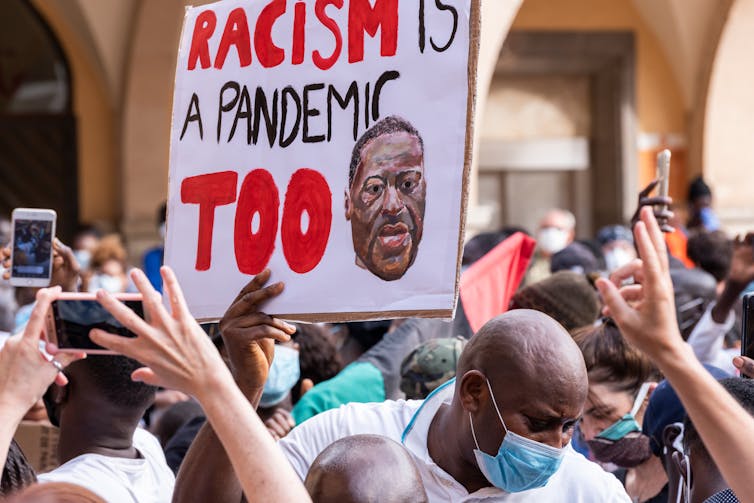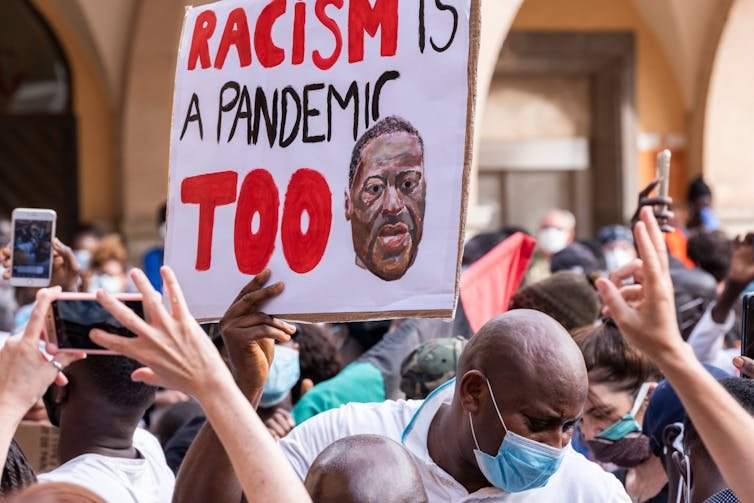It’s been almost exactly 15 years since Lehmann Brothers declared bankruptcy, marking the height of the financial crisis. Since then, we’ve entered the era of the “polycrisis” – where several catastrophic events are happening at once. We’re dealing with the aftermath of a pandemic, a war in Ukraine, extreme weather events, rising inflation and a food and energy crisis.
These events can be described as economic “shocks”, though the consequences may be drawn out for years. The key point about a shock is that it puts us out of equilibrium. And as we show in our recent paper, published in Proceedings of the Royal Society B, such shocks often lead to an uptick in negative stereotyping – making life even more miserable for millions.
Economic shocks exacerbate poverty, inequality and economic uncertainty, sowing the seeds of societal instability and conflict between groups. This is why understanding economic anxiety is important for understanding the rise of populist movements and the spread of political polarisation across the globe.
If we view other people as competitors for resources, and resources become scarce, our sense of competition will inevitably increase. If we view other people as close friends, who cooperate with us to mutually thrive, scarce resources will only increase our sense of beneficial interdependence.
Seeing people as competitors is not always bad. But who we view as competitors, and how we decide to treat them, is not usually the result of careful rational contemplation. Rather it’s a mixture of highly specific (and often unreliable) personal experiences and broad inherited cultural expectations.
Stereotypes involve attributing a set of characteristics to an entire group of people at the expense of their individual identity. It’s a mental shortcut that’s hardwired in us to help us survive by making decisions quickly when we lack information – about, for example, whether or not we can trust a stranger.
This can (but doesn’t have to) be a very bad thing, leading in the extreme to dehumanisation of those who are not like us. But once we know details about individuals from another group, we often realise they are rather similar to us – and see them increasingly as individuals.

AleFron/Shutterstock
The model
To understand the evolution of stereotypes, we created a computer model tracking how stereotypes form through a process of learning and cultural transmission of attitudes. We started by creating an “in-group” of close friends and family members, and then assumed everyone else belonged to “out-groups”.
The idea is that when people lack experience of interacting with out-group members, they are forced to base their attitudes towards them on stereotypes. But those stereotypes can be more or less coarse. We could treat anyone who is not part of the in-group the same – or distinguish between them.
We modelled how both the content (seeing subgroups positively or negatively) and the coarseness of the stereotypes changed over time as people learned from their experience. We defined learning as people changing their willingness to cooperate with members of a group based on past cooperation received from them.
We found that while stereotypes might not be avoidable, their content need not be negative (a rich person might view the working class as more honest, for example). Fairly positive stereotyping was common, provided it was not too difficult to find accurate information about how members behaved. This fits with real data showing that people in more diverse communities, where they have first-hand information about other groups, are less prejudiced.
We also showed that in the aftermath of a simulated economic shock, which reduced the income of everyone in our model, negative stereotyping of other groups emerged momentarily, even if positive stereotyping had been widespread before.
That’s because, when the world suddenly changes, our experiences and assumptions become outdated. We’re still working off assumptions based on how people behaved before. For example, people who suddenly find themselves poorer may be under increased stress or unable to contribute to their community in ways they had previously. If we don’t know them well enough to know their circumstances, we can develop an unduly negative impression of the sudden change.
If we were perfectly rational, we could all account for this and quickly find a new equilibrium that works for everybody. But if we are slow to react, there is a lingering mismatch between our stereotypical assumptions and the way people actually act. Our model shows that the consequence of that mismatch is to view people in an out-group more negatively.
This is bad because, in an era when more than one shock is being experienced at once, an exaggerated sense of conflict caused by one crisis can start to feed another.
What to do
When responding to a shock, the first challenge is to stop things from spiralling out of control. So we bail out banks, we go into lockdown. The second challenge is to figure out how to get back to an equilibrium.
Our work suggests that if we cannot stop the shocks, we must figure out how to get back to equilibrium faster. Negative stereotypes are exacerbated when we base our assumptions about how people will behave after a shock on faulty, outdated information. In the real world, this can be affected by things like echo chambers and misinformation.
Better information can allow us to adapt faster and dampen the negative effects of the shock. Part of achieving that means a shift in how we talk about each other, away from misinformation, vitriol and culture wars – and towards an overall improvement in the quality of our information systems.
This is not a simple answer, but we should be suspicious of simple answers to problems of the magnitude we currently face.
Ultimately, in these troubled times, we need to find a social equilibrium in which we view people unlike us as potential partners in cooperation rather than rivals for limited resources.

Felecia Phillips Ollie DD (h.c.) is the inspiring leader and founder of The Equality Network LLC (TEN). With a background in coaching, travel, and a career in news, Felecia brings a unique perspective to promoting diversity and inclusion. Holding a Bachelor’s Degree in English/Communications, she is passionate about creating a more inclusive future. From graduating from Mississippi Valley State University to leading initiatives like the Washington State Department of Ecology’s Equal Employment Opportunity Program, Felecia is dedicated to making a positive impact. Join her journey on our blog as she shares insights and leads the charge for equity through The Equality Network.




